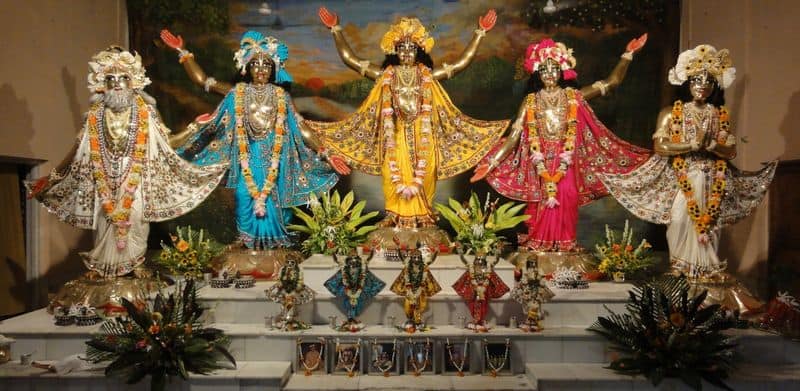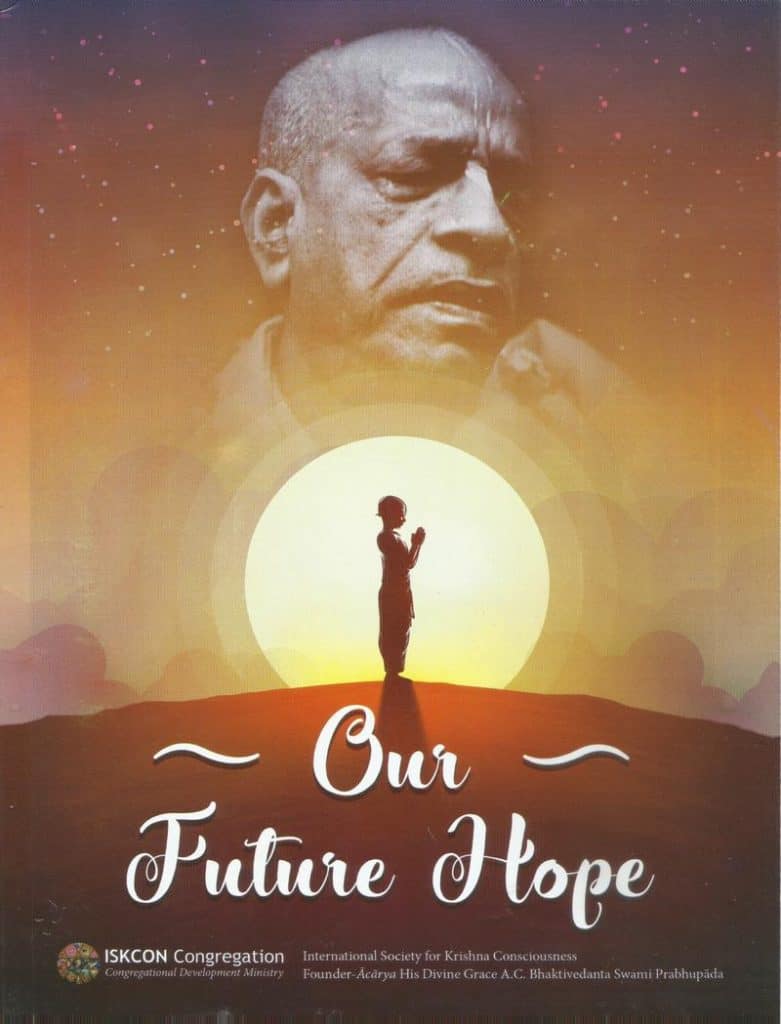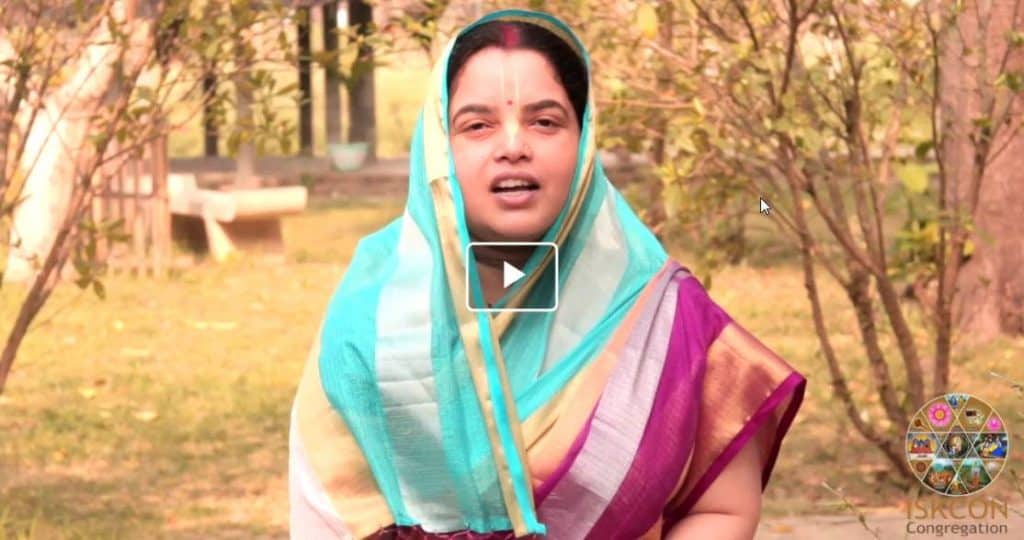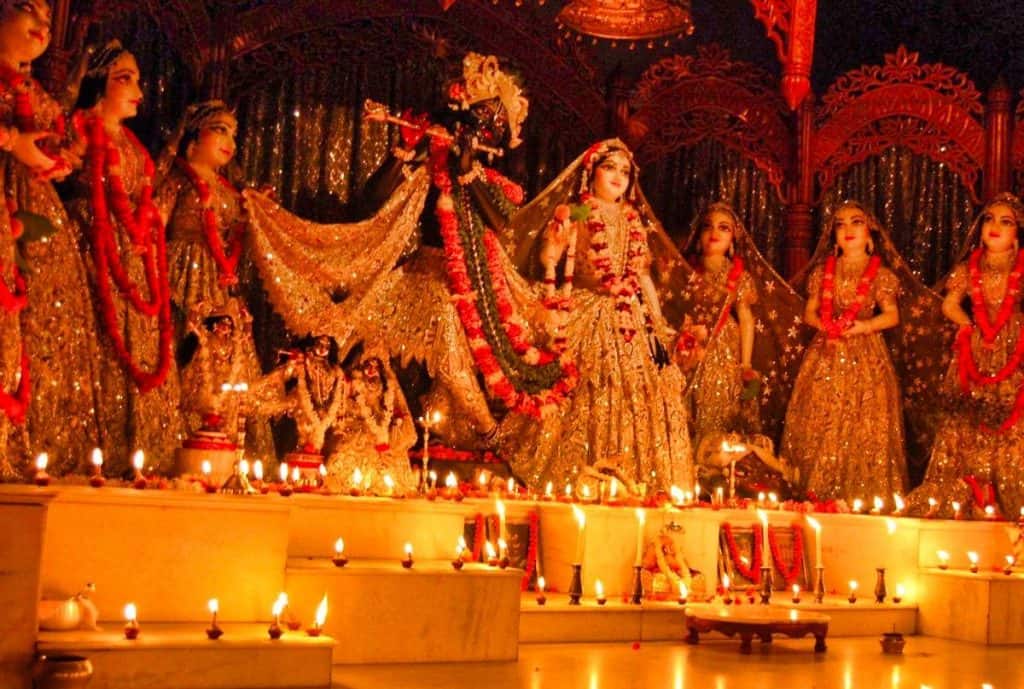This newsletter named Godruma Kalpatavi (The Desire-tree Grove of Godrumadvipa) was given to me by Bhakti Caru Swami. He liked these articles about the Nama Hatta.
The mercy of Lord Caitanya and Lord Nityananda descends through Their devotees. Devotees who have received krsna-prema by the mercy of Lord Caitanya Mahaprabhu are able to distribute this love of Godhead. Srila Bhaktivinoda Thakura illustrates this process by using an analogy: “the transcendental marketplace of the holy name of the Lord.”
Every devotee of Lord Caitanya has some position of devotional service within the Nama Hatta—whether it be to assist other devotees, to carry the message of the Lord, to analyze the purity of the devotion exhibited, or to train new devotees.
Lord Nityananda, being the owner of the commodities, is ultimately responsible for the sale and distribution of the holy name. His assistants were Svarupa Damodara and Ramananda Raya in Jagannatha Puri, Rupa Gosvami and Sanatana Gosvami in Vrndavana, and Advaita Acarya in Bengal. These were delegated representatives responsible for all the devotional activities conducted in their respective prabhu-datta-desa. For instance, when one Bengali devotee who was visiting Jagannatha Puri during the Gundica-marjana lila drank the water from Lord Caitanya’s lotus feet, Mahaprabhu chastised Svarupa Damodara, thereby showing that Svarupa Damodara was responsible for everyone’s activities.
The guards in the market were responsible to preserve the spiritual purity of devotional service. For instance, Damodara Pandita would immediately point out something that he thought might taint the Lord’s reputation. And Haridasa Thakura would always defend the glories of the holy name.
The storekeepers stored the Lord’s mercy, whereas the treasurers’ duty was to ensure that the mercy was distributed to the appropriate persons. Srivasa Pandita would decide who could participate in Lord Caitanya’s confidential kirtanas. Gopala Bhatta Gosvami would decide which Vaisnava practices were allowed. King Prataparudra was personally financing the Lord’s sankirtana movement in Jagannatha Puri.
The clerks and accountants kept track of how the money was spent. In that capacity, Vrndavana dasa Thakura wrote the sastra known as Sri Caitanya-bhagavata.
The mercy of Srimati Radharani to the conditioned souls is conveyed in the form of krsna-prasada. Thus the cooks within Nama Hatta, by their cooking, are also preachers. Srila Prabhupada mentioned that an army runs on its stomach. Therefore prasada is considered one of Caitanya Mahaprabhu’s special weapons, and thus the cooks are highly placed within the Nama Hatta. The great cooks mentioned herein would cook for Caitanya Mahaprabhu.
The currency examiners check whether one’s devotion is pure or merely an imitation. When Abhirama Thakura bowed before Lord Nityananda’s children, they died because they could not withstand the force of his obeisance. Whenever Abhirama Thakura would offer obeisance to any non–bona fide salagrama sila, it would immediately explode—so powerful were his obeisances. So it is important to consider whether the devotional service being exhibited by any person is genuine or not.
The mercy of the guru-parampara was transmitted through Madhavendra Puri and Isvara Puri. Thus they are the brokers for the entire parampara.
It is somewhat difficult to understand the meaning of all these terms used by Bhaktivinoda Thakura to describe the various personalities in the marketplace of the holy name.
The weighers would weigh the goods, to be distributed according to what price the costumers could pay. Various devotees participated in the Lord’s pastimes and were given mercy proportionately to what they deserved.
The servants were personal associates of Lord Caitanya and assisted Him in various ways.
The porters and cart-pullers carried the mercy. Nakula Brahmacari, a saktyavesa-avatara, carried Lord Caitanya within himself. Mahaprabhu spoke and acted through him. Suklambara Brahmacari would go from house to house to preach and take some alms; thus he always carried the mercy to various people. Sivananda Sena and Vasudeva Ghosa always carried with them a great quantity of the Lord’s mercy. Sivananda Sena took care of all the devotees when they traveled from Bengal to Jagannatha Puri for the annual Ratha-yatra festival. Vasudeva Datta was also a great carrier of the Lord’s mercy. He took on the sins of all living entities in the world.
The customers of the holy name obtained Mahaprabhu’s mercy. Sarvabhauma Bhattacarya, a Mayavadi, was delivered by the Lord. Jagai and Madhai, who were rascals, ruffians, criminals, and murderers, also received the Lord’s mercy. Prakasananda Sarasvati, a Mayavadi sannyasi, got that mercy. Some gentlemen, some ruffians, some Mayavadis, and so many others were recipients of Lord Caitanya’s mercy.
Through the context of a transcendental market of the holy name, Bhaktivinoda Thakura has very nicely explained the entire preaching movement of Lord Caitanya.
The purport is that in compliance with Lord Caitanya’s order, everyone must accept Krsna consciousness and also share it with others. According to individual capacity, everyone should become a vehicle for spreading the holy name of Krsna. It is not a stereotyped process. Anyone can do it under the guidance of a bona fide spiritual master, who functions as the representative of Lord Nityananda, the original spiritual master.



